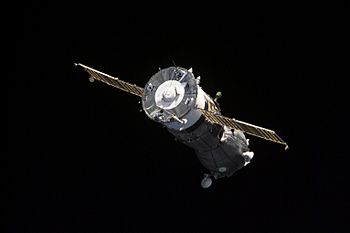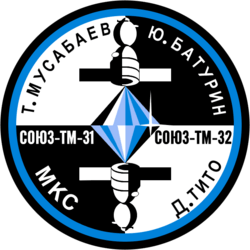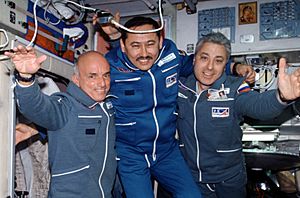Soyuz TM-32 facts for kids

TM-32 undocks on October 31st, 2001
|
|
| Operator | Rosaviakosmos |
|---|---|
| Mission duration | 185 days, 21 hours, 22 minutes, 40 seconds |
| Orbits completed | ~3,025 |
| Spacecraft properties | |
| Spacecraft type | Soyuz-TM |
| Manufacturer | RKK Energia |
| Crew | |
| Crew size | 3 |
| Launching | Talgat Musabayev Yuri Baturin Dennis Tito |
| Landing | Viktor M. Afanasyev Claudie Haigneré Konstantin Kozeyev |
| Callsign | Криста́лл (Kristall) |
| Start of mission | |
| Launch date | April 28, 2001, 07:37:20 UTC |
| Rocket | Soyuz-U |
| End of mission | |
| Landing date | October 31, 2001, 05:00:00 UTC |
| Landing site | Near Arkalyk 46°44′58″N 69°42′58″E / 46.74944°N 69.71611°E |
| Orbital parameters | |
| Reference system | Geocentric |
| Regime | Low Earth |
| Perigee | 193 kilometres (120 mi) |
| Apogee | 247 kilometres (153 mi) |
| Inclination | 51.6 degrees |
| Period | 88.6 minutes |
| Docking with ISS | |
| Docking port | Zarya nadir |
| Docking date | 30 April 2001 07:58 UTC |
| Undocking date | 19 October 2001 10:48 UTC |
| Time docked | 172d 2h 50m |
| Docking with ISS (Relocation) |
|
| Docking port | Pirs nadir |
| Docking date | 19 October 2001 11:04 UTC |
| Undocking date | 31 October 2001 01:38 UTC |
| Time docked | 11d 14h 34m |
  Soyuz TM-32 Taxi crewmembers in the Zvezda Service Module Soyuz programme
(Crewed missions) |
|
The Soyuz TM-32 was a special space mission that launched on April 28, 2001. It carried a crew of three people into space. Two days later, the spacecraft connected, or "docked," with the International Space Station (ISS). This mission was exciting because it took the very first paying space tourist, Dennis Tito, into orbit!
The Soyuz TM-32 stayed connected to the space station for many months. It acted as a "lifeboat" for the astronauts living on the ISS. This means it was always ready to bring the crew safely back to Earth if there was an emergency. The spacecraft finally returned to Earth in October 2001, bringing a new crew home.
Contents
Meet the Crew
The Soyuz TM-32 mission had different crews for its launch and its return.
Launching Crew
The three people who launched into space on Soyuz TM-32 were:
- Commander:
 Talgat Musabayev from Kazakhstan. This was his third and last trip to space.
Talgat Musabayev from Kazakhstan. This was his third and last trip to space. - Flight Engineer:
 Yuri Baturin from Russia. This was his second and last spaceflight.
Yuri Baturin from Russia. This was his second and last spaceflight. - Spaceflight Participant:
 Dennis Tito from the USA. He was the first person to pay for his own trip to space. This was his only spaceflight.
Dennis Tito from the USA. He was the first person to pay for his own trip to space. This was his only spaceflight.
Landing Crew
When Soyuz TM-32 returned to Earth, it carried a different group of astronauts:
 Viktor M. Afanasyev from Russia. This was his fourth and last space mission.
Viktor M. Afanasyev from Russia. This was his fourth and last space mission. Claudie Haigneré from France, representing the ESA. This was her second and last spaceflight.
Claudie Haigneré from France, representing the ESA. This was her second and last spaceflight. Konstantin Kozeyev from Russia. This was his only space mission.
Konstantin Kozeyev from Russia. This was his only space mission.
Journey to the Space Station
The Soyuz TM-32 spacecraft had an important job: to deliver its crew to the International Space Station (ISS).
Docking and Staying Connected
- On April 30, 2001, at 07:58 UTC, the Soyuz TM-32 automatically connected with the ISS. It linked up with a part of the station called the Zarya module. This happened just hours after another spacecraft, the Space Shuttle Endeavour, had left the station.
- The crew who launched on TM-32 stayed on the ISS for about a week. They then returned to Earth inside another Soyuz spacecraft, the Soyuz TM-31. That spacecraft had been docked to the station since November 2000, also serving as a "lifeboat" for the astronauts already living there.
A New Lifeboat
- After the original crew left, Soyuz TM-32 stayed docked to the ISS. Its new role was to be the emergency "lifeboat" for the astronauts of Expedition 2 and later Expedition 3. This meant it was always ready to bring the station's crew home if needed.
- On October 19, 2001, the Soyuz TM-32 moved from the Zarya module to another part of the station called the Pirs module. This was a short move to make space for other visiting spacecraft.
- Finally, on October 31, 2001, the Soyuz TM-32 undocked from the Pirs module. It then brought home two Russian cosmonauts and an ESA astronaut who had arrived at the station a week earlier on a different mission, Soyuz TM-33.
See also
 In Spanish: Soyuz TM-32 para niños
In Spanish: Soyuz TM-32 para niños
 | James B. Knighten |
 | Azellia White |
 | Willa Brown |

